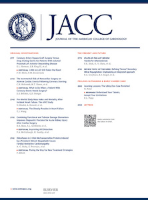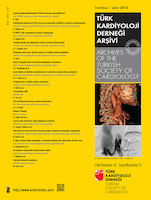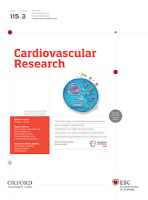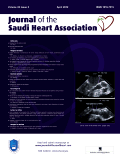
JOURNAL OF THE AMERICAN COLLEGE OF CARDIOLOGY
Scope & Guideline
Elevating Cardiac Science Through Innovative Insights
Introduction
Aims and Scopes
- Cardiovascular Interventions:
Research related to innovative techniques and strategies in catheter-based interventions, surgical procedures, and their outcomes in managing cardiovascular diseases. - Heart Failure and Cardiomyopathy:
Studies focusing on the mechanisms, treatment options, and outcomes related to heart failure and various forms of cardiomyopathy, including hypertrophic and dilated cardiomyopathy. - Atherosclerosis and Risk Factors:
Investigations into the pathophysiology, prevention, and treatment of atherosclerosis, including lipid management and the impact of lifestyle factors on cardiovascular health. - Arrhythmias and Electrophysiology:
Research on the mechanisms, treatment, and outcomes of various arrhythmias, including atrial fibrillation and ventricular tachycardia, as well as advancements in electrophysiological techniques. - Epidemiology and Public Health:
Studies addressing the epidemiology of cardiovascular diseases, including disparities in health outcomes across different demographics and the impact of social determinants on cardiovascular health. - Novel Therapeutics and Biomarkers:
Research focusing on the development and evaluation of new therapeutic agents and biomarkers for cardiovascular diseases, including pharmacogenomics and personalized medicine.
Trending and Emerging
- Artificial Intelligence and Machine Learning:
The integration of AI and machine learning in cardiovascular diagnostics, risk prediction, and treatment optimization is rapidly emerging, highlighting the potential for enhanced patient care through technology. - Telemedicine and Remote Monitoring:
There is a growing body of research focused on telehealth strategies and remote patient monitoring, especially in light of the COVID-19 pandemic, which has accelerated the adoption of these practices. - Heart Failure with Preserved Ejection Fraction (HFpEF):
Research on HFpEF is gaining traction as it represents a significant and challenging area of heart failure management, with ongoing studies exploring its pathophysiology and treatment options. - Social Determinants of Health:
Increasing attention is being paid to how socioeconomic factors and disparities affect cardiovascular health outcomes, driving research aimed at addressing these issues. - Cardiovascular-Kidney Interactions:
The relationship between cardiovascular health and kidney function is increasingly recognized, leading to studies exploring how these systems interact and influence each other.
Declining or Waning
- Traditional Risk Factors:
Research on conventional cardiovascular risk factors such as hyperlipidemia and hypertension has seen reduced emphasis as newer biomarkers and risk assessment tools are developed. - Invasive Procedures:
Interest in traditional invasive procedures may be waning as non-invasive techniques and advancements in medical therapy gain prominence, particularly in the context of evolving guidelines. - Generalized Cardiovascular Guidelines:
The publication of broad cardiovascular guidelines is decreasing as more specialized and targeted guidelines emerge, focusing on specific populations or conditions. - Basic Science Research:
There appears to be a shift away from purely mechanistic studies in basic science towards translational research that directly impacts clinical practice and patient care. - Longitudinal Studies:
Long-term cohort studies may be declining in favor of shorter, more focused trials that can provide quicker insights into specific interventions or therapies.
Similar Journals

Netherlands Heart Journal
Exploring Innovations in Heart Health and Disease ManagementNetherlands Heart Journal is a premier academic publication dedicated to advancing knowledge in the field of cardiology and cardiovascular medicine. Published by BOHN STAFLEU VAN LOGHUM BV, this journal has established itself as a critical platform for researchers, professionals, and students seeking to explore groundbreaking findings and innovative practices in cardiovascular health. With an ISSN of 1568-5888 and E-ISSN 1876-6250, the journal boasts a respectable Q2 ranking in the Cardiology and Cardiovascular Medicine category, placing it in the top half of its field according to the 2023 quartiles. The Scopus ranking places it 130th out of 387 in the relevant category, indicating a commendable percentile rank of 66th, which attests to its influence and quality of published research. Spanning from 2005 to 2024, the journal endeavors to include a diverse array of topics, encompassing clinical practice, technological innovations, and public health considerations related to cardiovascular diseases. Researchers and practitioners are encouraged to engage with the journal's robust content, contributing to and benefiting from the collaborative effort to enhance cardiovascular health worldwide.

Turk Kardiyoloji Dernegi Arsivi-Archives of the Turkish Society of Cardiology
Advancing cardiovascular knowledge for a healthier tomorrow.Turk Kardiyoloji Dernegi Arsivi-Archives of the Turkish Society of Cardiology is a prominent peer-reviewed journal dedicated to advancing the field of cardiology and cardiovascular medicine. Published by KARE PUBL, this journal has established itself as a key resource for researchers, healthcare professionals, and students since its inception in 1990. As an Open Access journal since 2017, it ensures that cutting-edge research and clinical findings are readily accessible to a global audience, thus fostering collaboration and knowledge sharing among the cardiology community. With its recent rank in the Q3 quartile for Cardiology and Cardiovascular Medicine in 2023, and a Scopus rank of #282 out of 387, the journal is positioned to enhance its influence in the cardiovascular field, offering valuable insights and promoting evidence-based practices. The journal covers a wide range of topics within cardiology and cardiovascular research, making it an essential platform for scholars aiming to contribute to the ongoing dialogue in this vital area of medicine. For those eager to stay updated with the latest research trends and clinical practices in cardiology, Turk Kardiyoloji Dernegi Arsivi represents a crucial resource.

BASIC RESEARCH IN CARDIOLOGY
Shaping the future of cardiology with impactful studies.BASIC RESEARCH IN CARDIOLOGY, published by SPRINGER HEIDELBERG, is an esteemed peer-reviewed journal dedicated to advancing the field of cardiology and cardiovascular medicine since 1973. With a strong emphasis on the latest breakthroughs in basic and translational research, this journal offers a platform for high-quality, impactful studies that contribute to our understanding of cardiac function and related physiological processes. Currently ranked in the Q1 category in Cardiology and Cardiovascular Medicine, as well as Physiology and Medical Physiology, BASIC RESEARCH IN CARDIOLOGY is recognized as a leading journal within these disciplines, boasting impressive Scopus ranks that place it in the top tiers of global research output. While it does not offer open access, its contributions are pivotal for researchers, clinicians, and students seeking to stay abreast of cutting-edge discoveries and methodologies in cardiovascular science. With its commitment to scholarly excellence, this journal plays a critical role in shaping the future of cardiac research and clinical practice.

CURRENT CARDIOLOGY REVIEWS
Illuminating Contemporary Cardiovascular ChallengesCURRENT CARDIOLOGY REVIEWS, an esteemed journal published by BENTHAM SCIENCE PUBL LTD, is a pivotal resource in the field of cardiology and cardiovascular medicine. With an ISSN of 1573-403X and E-ISSN of 1875-6557, this journal presents comprehensive reviews that contribute significantly to the advancement of scientific knowledge and clinical practices in cardiology. Operating with open access options, CURRENT CARDIOLOGY REVIEWS is dedicated to bridging the gap between research and practice, thereby encouraging interdisciplinary collaboration and knowledge sharing. The journal has been instrumental in disseminating high-impact findings, consistently maintaining a Q2 category ranking in both Cardiology and Cardiovascular Medicine, as well as within the miscellaneous categories of Medicine, highlighting its relevance and respect in the academic community. Researchers, practitioners, and students alike will find valuable insights into contemporary cardiovascular issues, practices, and innovations that promote better patient outcomes. Based in the United Arab Emirates, CURRENT CARDIOLOGY REVIEWS encourages global contributions and reflects the latest advancements up to the year 2024, solidifying its role as an essential publication for those engaged in the quest for excellence in cardiovascular health.

Nepalese Heart Journal
Connecting Researchers and Clinicians for a Healthier FutureNepalese Heart Journal, published by the CARDIAC SOC NEPAL, serves as a premier platform for disseminating knowledge in the field of cardiology and cardiovascular health. With an ISSN of 2091-2978, this journal aims to bridge the gap between researchers, clinicians, and academicians by presenting high-quality, peer-reviewed articles that address clinical practices, innovative research, and emerging trends in heart disease management, especially within the context of Nepal and the surrounding region. Although it operates under a traditional publishing model, its commitment to excellence aids in reinforcing the scientific discourse in an area critical to public health. The journal is a valuable resource for professionals and students alike who are focused on advancing their understanding of cardiology and its implications for health policy and practice. Exploring the intersections of local challenges and global advancements in heart health, the Nepalese Heart Journal is poised to contribute meaningfully to the evolving landscape of cardiovascular research.

CARDIOVASCULAR RESEARCH
Exploring the complexities of cardiovascular health.CARDIOVASCULAR RESEARCH, published by Oxford University Press, is a premier academic journal dedicated to the evolving field of cardiology and cardiovascular medicine. With a remarkable impact factor reflecting its significant contribution to the scientific community, this journal maintains a Q1 ranking in both Cardiology and Physiology categories, demonstrating its commitment to publishing high-quality research that influences clinical practices and healthcare outcomes. Established in 1967, the journal has consistently provided a platform for innovative studies and reviews, aiming to advance our understanding of cardiovascular physiology and pathology. Researchers, professionals, and students will find published articles crucial for their work, as the journal covers a broad spectrum of topics including molecular biology, genetics, and clinical studies. While currently not offering open access options, CARDIOVASCULAR RESEARCH remains accessible through institutional and individual subscriptions, ensuring that the latest findings are available to those in the cardiovascular science community.

Revista de la Federacion Argentina de Cardiologia
Advancing cardiovascular knowledge for a healthier tomorrow.Revista de la Federacion Argentina de Cardiologia is a vital publication in the field of Cardiology and Cardiovascular Medicine, providing a platform for researchers and healthcare professionals to share significant findings and innovative concepts since its inception in 2012. Published by the Federacion Argentina Cardiology, this journal specifically addresses contemporary issues and advancements within cardiology, contributing to the scholarly dialogue essential for improving cardiovascular health. Despite being categorized in the Q4 quartile for 2023 and presently ranking #358 out of 387 in its field, the journal remains committed to fostering academic inquiry and disseminating valuable research for both local and global audiences. Although it is not an open-access journal, it strives to balance accessibility with rigorous academic standards, ensuring quality contributions that are critical for practitioners and students alike. The journal’s ongoing evaluation and adaptation in the ever-evolving landscape of cardiology underscore its importance in advancing cardiovascular science and practice.

CANADIAN JOURNAL OF CARDIOLOGY
Transforming Cardiology with High-Impact ResearchCanadian Journal of Cardiology (ISSN: 0828-282X, E-ISSN: 1916-7075), published by Elsevier Science Inc, serves as a vital platform for disseminating high-quality research in the dynamic field of cardiology and cardiovascular medicine. Since its inception in 1985, this journal has established itself as a leader in the field, currently holding a prestigious Q1 ranking in Cardiology, indicating its significant impact and contribution to medical science. With a Scopus rank of #50 out of 387 in its category and placing in the 87th percentile, the journal showcases rigorous peer-reviewed articles that advance knowledge and practice in cardiology. Although the journal is not open access, it provides valuable insights and research findings that cater to clinicians, researchers, and students who are committed to improving cardiovascular health. As we approach the convergence of years to 2024, the Canadian Journal of Cardiology continues to strive for excellence, facilitating a discourse vital for both academic and clinical advancements in cardiology.

Journal of the Saudi Heart Association
Advancing Cardiovascular Knowledge for a Healthier TomorrowThe Journal of the Saudi Heart Association is a prominent scholarly publication dedicated to advancing knowledge in the fields of cardiology and cardiovascular medicine. Published by DIGITAL COMMONS BEPRESS, this open-access journal has been serving the global community since 2009, providing a vital platform for researchers, practitioners, and students interested in the latest developments in heart health and disease management. With an ISSN of 1016-7315 and a growing repository of knowledge alongside an E-ISSN of 2212-5043, the journal showcases an array of peer-reviewed articles that contribute to the understanding of cardiovascular conditions. Although categorized in the Q4 quartile for 2023, it remains committed to offering valuable insights, particularly within the constraints of the 29th percentile rank specified by Scopus. As the journal converges towards 2024, it continues to foster collaboration, innovation, and inquiry within the Saudi Arabian and international medical communities.

Heart International
Advancing cardiovascular knowledge for a healthier tomorrow.Heart International is a prominent open-access journal dedicated to the fields of cardiology and cardiovascular medicine, published by TOUCH MEDICAL MEDIA LTD since 2006. Based in Italy, this journal serves as a vital platform for researchers, clinicians, and students, aiming to disseminate cutting-edge scientific findings and clinical insights that advance the understanding of heart health. With an ISSN of 2036-2579 and an emphasis on accessible content, Heart International ensures that valuable research is available to a wide audience, thereby contributing to the global discourse on cardiovascular issues. Although it currently holds a Q4 quartile ranking in its category and is positioned in the lower percentile for Scopus rankings, the journal is committed to improving its impact through rigorous peer review and high-quality publications. The journal covers a wide array of topics within the cardiology domain, making it an essential resource for those looking to stay abreast of the latest developments in heart research.